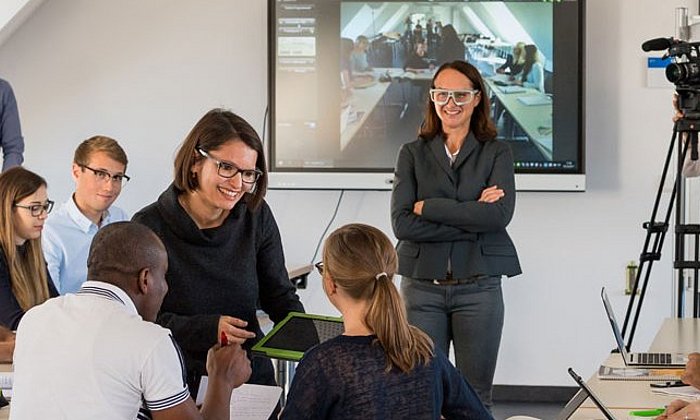Competence center for vocational school teacher training
New education for the digital transformation

There is no doubt that digitalization is changing almost every professional field, and that pupils should be well prepared for this transition. But what skills do teachers need to achieve this goal in the classroom?
Vocational schools face special challenges: It is now more difficult than ever to limit classroom teaching to profession-specific content: For example, in the health care sector medical, technological and ethical questions are converging – and the career fields themselves are constantly evolving. Teachers are more called upon to convey problem-solving skills, creativity and communicative skills to their students. "It's no longer enough for teacher training curricula to show future teachers how to explain digital media to their young students," says Eveline Wittmann, a professor for vocational education at TUM. "We much more have to rethink vocational schools and thus also teacher training curricula."
Activating expertise from companies
Accordingly, TUM has founded the competence center digIT4.0@TUM, which will develop and test new educational concepts and make them available to other stakeholders in teacher training curricula. The center is being funded by the German Federal Ministry of Education and Research with approximately 1.9 million euros from the "Qualitätsoffensive Lehrerbildung" quality campaign for teacher training, in which TUM was successful last year for the third time, after winning funding in 2015 and 2018 as well.
The center's characteristic objective is to involve players well beyond the world of the university in vocational training: Companies of various sizes and from different industry sectors, artisans' organizations and business associations, institutions in the school sector, policy makers and other universities. "Vocational schools and educational research have collaborated with industry in the past. But the next step has only rarely been taken: Vocational school teacher training hardly involved any exchange, although the experts on current developments in professional fields are to be found in the companies," says Wittmann. "The center's launch has been greeted with great interest in working together on the part of the business sector."
New digital laboratory
In a first step the center will establish four topic areas in the new digital laboratory (TUM-DigiLLab) at the TUM School of Education: industry 4.0, smart home, health care as well as gastronomy and food retail. Here teachers in training can use the respective technologies to work through concrete situations from the working world.
The smart home area for example involves a scenario in which caregivers tend to patients with the support of sensor-based and video-based technologies. Here questions arising go well beyond technology: Healthcare personnel have to reconcile the evaluation of collected data with the demands for self-determination on the part of the patient. Electronics specialists who install these technologies should thus for example also be able to respond to caregivers’ questions about privacy and data protection.
Continuing education planned
In the other topic areas, questions addressed will also go beyond conventional topics, for example regarding resource-efficient use of materials. "We intend to use these scenarios to make it possible for future teachers to understand and reflect on the significance of this kind of questions in the respective professional context," says Wittmann. "They should be able to develop ideas for conveying to their students a sense of ethically responsible, competent and sustainable actions. We also want to increase the teachers' ability to work together with disciplines outside of their own specialty areas."
The seminar courses – for example role playing for certain classroom situations – can be filmed in the digital laboratory, so that the teachers in training can discuss their approaches afterwards. The digIT4.0@TUM is aimed not only at future teaching staff, but will also focus on new continuing education content for teachers already on the job.
- The TUM concept Teach@TUM4.0 has received funding in the German federal and state "Qualitätsoffensive Lehrerbildung" teacher training quality program since 2020. TUM was also successful in the program with Teach@TUM in 2015 and 2018.
- One part of this program is the Master's program "Berufliche Bildung Integriert", launched in 2016. Intended for those changing careers from engineering disciplines, the program aims to address the scarcity of young teaching staff at vocational schools. Unique about the degree program is the combination of university studies and the teacher training phase in a single program, making it possible to teach content in a more structured manner and shortening the overall training period to three years without making substantive or qualitative compromises. 36 students have already successfully completed the degree program, and another 65 students are currently enrolled.
- In addition, the TUM School of Education has set up two online portals which are freely available for teacher training curricula: The "Toolbox Lehrerbildung" offers multimedia materials for the STEM subjects. The "Clearing House Unterricht" provides an easily understandable survey of the current state of school and classroom research.
Technical University of Munich
Corporate Communications Center
- Klaus Becker
- klaus.becker@tum.de
- presse@tum.de
- Teamwebsite
Contacts to this article:
Prof. Eveline Wittmann
Technical University of Munich
Chair of Vocational Education
Tel: +49 89 289 24317
eveline.wittmann@tum.de



